
After revealing a longlist of 32 proposals imagining our post-pandemic world last week, RIBA's Rethink: 2025 international design competition announced the twelve shortlisted entries this morning.
The brief tasked architects and students to envision what our built environment after Covid-19 might look like in 2025 taking into consideration one or several of these areas: healthcare spaces, remote learning, high-density living, public transport, high streets vs online shopping, international travel, and the use of technology to monitor and control populations.
These are the shortlisted ideas:
Get Everyone In by Benjamin Holland, Olivia Dolan, Katie Williams (cover picture)
"The project proposes reusing empty office space to house the homeless. Through the redesign of office towers, it suggests the inclusion of communal health facilities on ground level, bringing nature into the space with gardens at the mid-level and translating a deep plan office floor into hostel-style bedrooms on upper floors, with space left to accommodate some office workers."
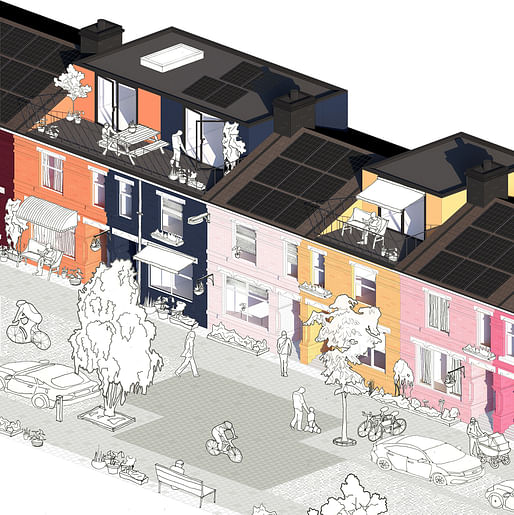
A Catalogue of Regeneration by Andrew Jackson
"This project proposes a series of incremental improvements that can be made to streets and houses. The step-by-step guide sets out five key stages of regeneration, starting with repairing potholes, through to the creation of ’woonerf’ zones – traffic calmed streets, and ultimately work to improve and expand individual homes. With sustainability at its heart, this idea works with the existing buildings, using inner city Manchester terraces as the case study within the proposal."
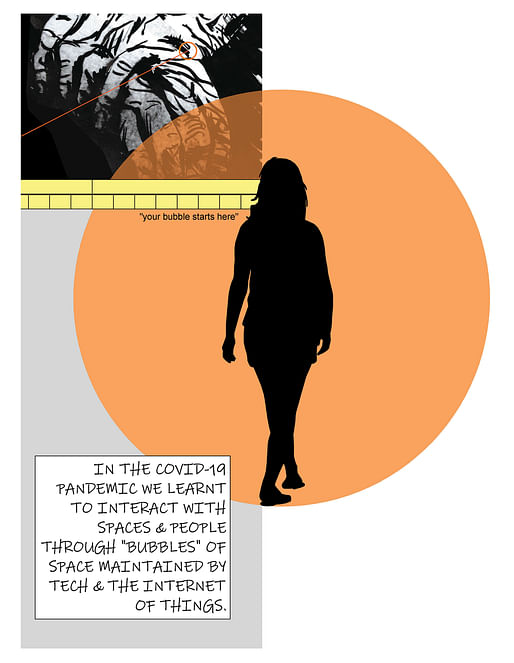
Childbirth Made Personal by Sarah Joyce, University of Leeds
"This entry was presented through emotive drawings that drew out of the impact of the pandemic on childbirth and the essential element of touch. Using the coronavirus concept of ‘bubbles’ and virtual connections, Childbirth Made Personal suggests that the way we design will change with the use of light-touch interventions and personalised pathways. It encapsulates the idea of the ‘safe outside’ versus the unsafe inside, where births take place. It gently describes how the birthing experience will be affected by thinking of ‘people as carriers of infectious diseases and surfaces as transmitters’."
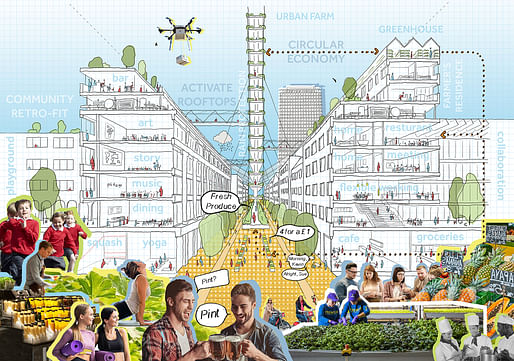
Community Retrofit by Farrells
"This proposal details the reinvention of commuter hubs and tourist destinations of city centres as localised districts with less travel, homeworking and very limited shopping. Empty department stores and half-used office spaces are retrofitted with a school, an urban farm, new homes, bars, cafés, collaborative working spaces and leisure facilities in close proximity, providing maximum opportunities for social interaction and chance encounters."
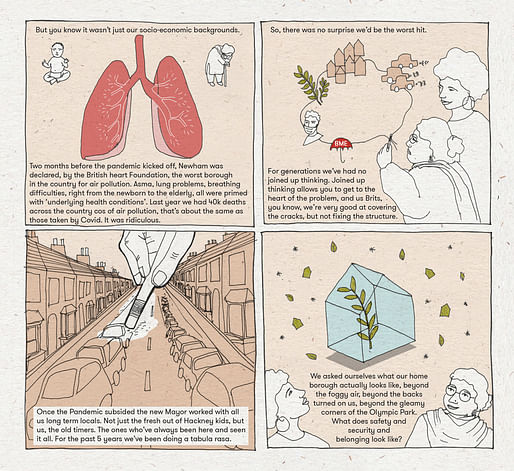
Eco-Archi Post Covid by Khan Bonshek
"This proposal seeks to address challenges faced by ethnic minority communities who have been disproportionately affected by coronavirus. Often excluded from planning decision-making, ethnic minorities also often live in more built-up and polluted areas. This idea seeks to address this through engaging the local community and working with local government to make tangible changes. Presented in the form of a comic, the proposal focuses on Newham which has the highest air pollution in London. It proposes making it the Green Lungs of London by radically cutting road traffic on domestic streets and changing the culture of car driving."
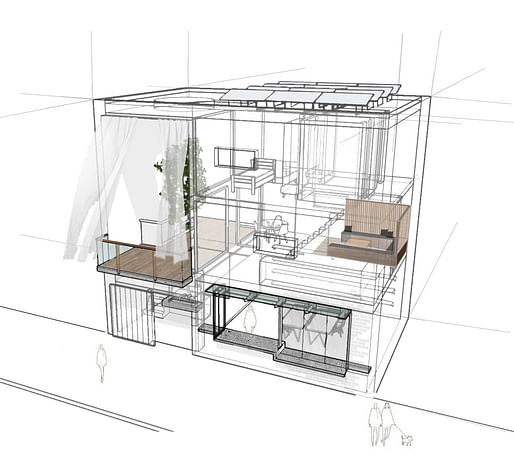
Far off is close at hand by Haslam & Co Architects
"This proposes a clever way to repurpose existing buildings through a reimagining of the high street. Converting existing shops into homes that still function as a point of exchange – with spaces for meeting and entertaining."
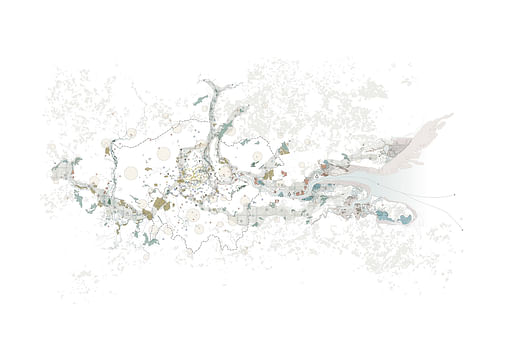
Greater London Agriculture by Tim Rodber and Dominic Walker
"The most ambitious proposition in terms of scale, this idea centres around agriculture becoming interwoven with the city - tiny mapped patchworks of food production linked over time by corridors of biodiversity. From community orchards to seaweed farms based around existing green spaces and low carbon transport links – this an agroecological approach to land use and a green innovation network. Local, regenerative food production is intended to build respect for food, offer super-fresh seasonal produce. In increasing biodiversity and allowing wider ecosystems to recover it could also play a part in reducing threats of future pandemics."
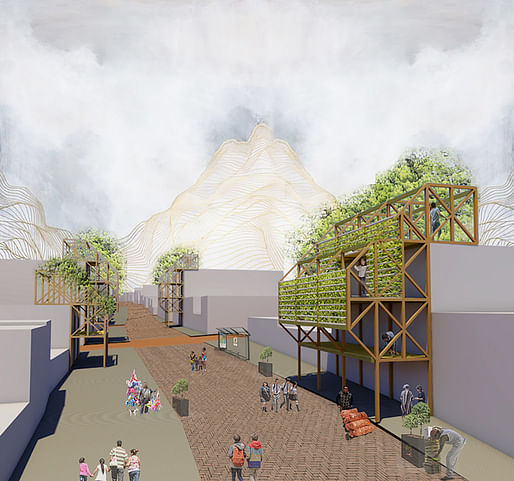
House Farm - Peru by Kenyi Kevin and Sulca Quichca, Universidad Nacional de Ingenieria
"Explicitly set in the Villa Maria del Triunfo district of Lima, this proposes a timber extension to create a new space between private home and public social space. It offers hydroponic growing space for fruit and vegetables. It appeals to the desire for food security sparked by the pandemic and would reduce crowds in markets say the designers."
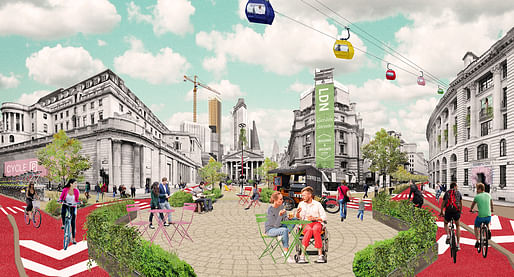
Post Pandemic Exchange by Elle Thompson, University of Nottingham
"This proposal tackles the use and function of three buildings types and the streets around them. Garden streets are created in city centres, improving the journeys that remain. While shops and high streets are out of favour, this entry argues that entrepreneurship can flourish in the form of markets and rooftop exercise classes with bank frontages taken over by ambitious bakery businesses. The final condition that is examined is that of the much neglected suburbia. Prefabricated extensions expand homes and front gardens to take over the streets."
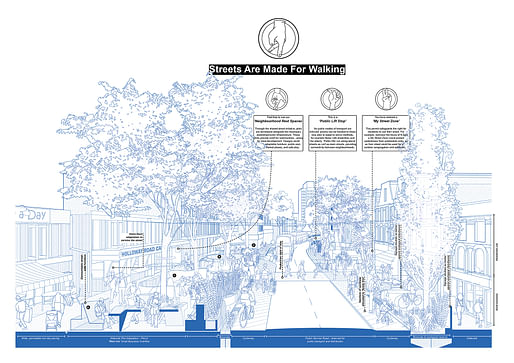
Streets are Made for Walking by People Matter.
"This project takes the reduced capacity of public transport and the increased space allocated to cycling and pedestrian infrastructure. It develops a method for implementing ‘Shared Streets’ with cleaner, greener, safer environments. Modelling is done on Holloway Road, an arterial route in North London. Placemaking and ‘purposeful’ streets are a priority in stage one to 2025, helping build local identity. 2025-2035 would see the development of ‘inter-neighbourhood connections, in lateral rings expanding from the city centre’ – increasing the potential for polycentricity and reducing demand on the city centre."
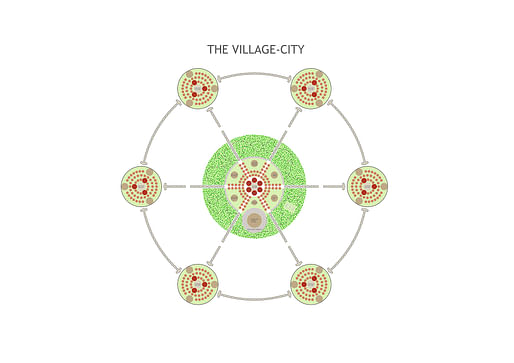
Village City by Stephen Macbean
"This proposal suggests a new rural model to revive denuded villages - producing the facilities of a town for a cluster of villages. How do we allow villages to retain their character but be fit for the future? How do we re-invest the concept of localism? And how do we capitalise on the improved air quality and the move to zero carbon? The village-city would include a health centre; care home; sheltered housing; shops; bank or post office; cafe; learning resource centre for workshops and evening classes; office for meetings and small businesses; gym or sports hall; renewable energy centre. Ideally all this would be 10,000 steps (4km) there and back from each village – a healthy, walkable distance. And around this centre the proposal is to plant 40,000 trees interspersed with running and cycling trails."
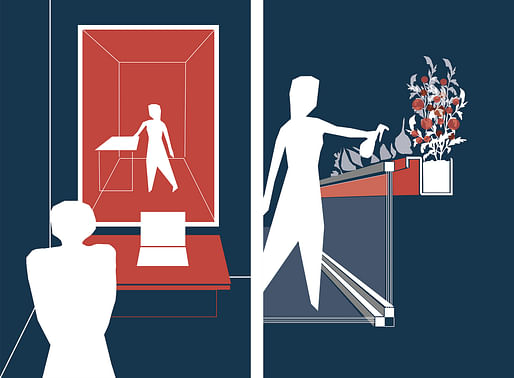
Window Living by Alice Vivoda, Patricia Schleeh, Eva Setz Kengen and Mark Kengen, The University of Edinburgh
"With outdoor space being more important than ever before, Window Living gives those without immediate access to such space a chance to have it retrofitted. Window Living proposes a clever window that can swing open into a balcony or a half bay to be enjoyed as a semi-outdoor bench – giving different states of interaction with nature, neighbours and the city. ‘Step out of the box and through the window,’ urge the designers. For lockdown recurrences and rainy days, the set up also acts as a virtual window with HD screen, allowing a full perspective so communication is not just from behind the computer."
The competition's judging panel includes Francine Houben (Creative Director, Founding Partner at Mecanoo); Matt Jones (Principal Designer at Google AI, RIBA Trustee); Sarah Castle (Director, Co-Founder at IF_DO); Ed Clark (Director of Structural Engineering at Arup); Asif Khan (founder, Asif Khan); Joanne Averley (London Mayor Design Advocate, incoming Chief Planner at MHCLG); and jury chair Hugh Pearman (RIBA Journal Editor).
Check back on Monday, July 27, for the announcement of the winning entry.
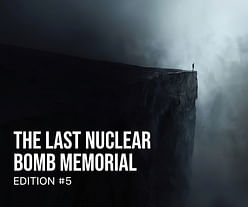
The Last Nuclear Bomb Memorial / Edition #5
Register by Thu, Jan 16, 2025
Submit by Wed, Feb 19, 2025
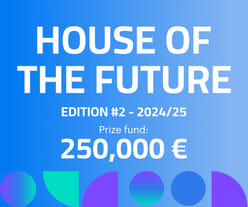
250,000 € Prize / HOUSE OF THE FUTURE 2024/25
Register by Wed, Apr 30, 2025
Submit by Mon, Jun 2, 2025
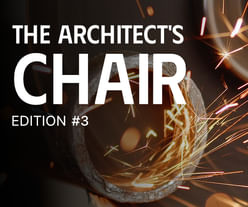
The Architect's Chair / Edition #3
Register by Wed, Jan 15, 2025
Submit by Tue, Feb 18, 2025
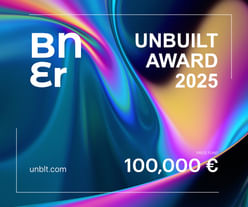
100,000 € Prize / Buildner's Unbuilt Award 2025
Register by Thu, Oct 30, 2025
Submit by Thu, Nov 20, 2025
No Comments